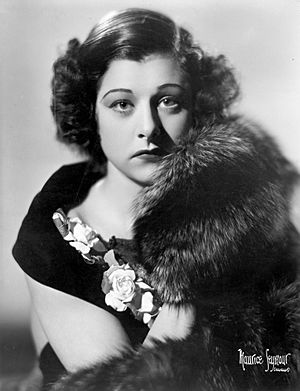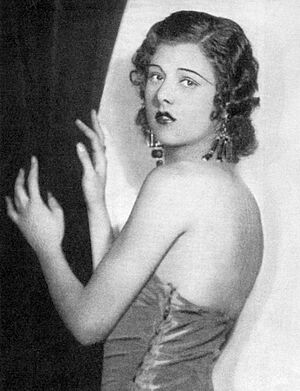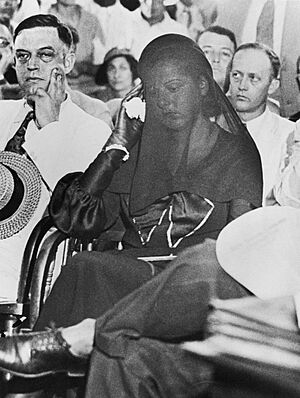Libby Holman facts for kids
Quick facts for kids
Libby Holman
|
|
|---|---|

Holman in 1935
|
|
| Born |
Elizabeth Lloyd Holzman
May 23, 1904 Cincinnati, Ohio, U.S.
|
| Died | June 18, 1971 (aged 67) Stamford, Connecticut, U.S.
|
| Occupation |
|
| Years active | 1924–1971 |
| Spouse(s) |
Zachary Smith Reynolds
(m. 1931; died 1932)Ralph Holmes
(m. 1939; died 1945)Louis Schanker
(m. 1960) |
| Children | 3 |
Elizabeth Lloyd Holman (born Holzman; May 23, 1904 – June 18, 1971) was an American socialite, actress, singer, and activist. She became famous for her powerful voice and dramatic performances on Broadway. Later in life, she used her influence and wealth to support important causes, especially the Civil Rights Movement.
Contents
Early Life and Education
Elizabeth Lloyd Holzman was born on May 23, 1904, in Cincinnati, Ohio. Her father was a lawyer and stockbroker. When she was young, her family lost a lot of money due to a financial problem involving her uncle. Around the time of World War I, her family changed their last name from Holzman to Holman because of strong anti-German feelings in the country.
Libby was a bright student. She graduated from Hughes High School in Cincinnati when she was 16. She then went on to the University of Cincinnati, earning a Bachelor of Arts degree in 1923. Later, she sometimes said she was two years younger than she actually was.
Becoming a Star on Stage
In the fall of 1924, Libby Holman moved to New York City to become an actress. She took classes at Columbia University and soon found her first job in a play called The Fool. The writer of the play, Channing Pollock, quickly saw her talent and encouraged her to pursue acting.
A producer named Leonard Sillman suggested she use the name "Libby," which she did. An early friend and colleague was Clifton Webb, who later became a famous film star. He gave her the nickname "The Statue of Libby."
Libby made her Broadway debut in 1925 in a play called The Sapphire Ring. Her big break came in 1929 when she starred in the Broadway show The Little Show. In this show, she sang the famous blues song "Moanin' Low". The audience loved it so much that she had to come out for many curtain calls. This song became her signature tune. She also sang "Can't We Be Friends?" in the same show. Libby became known as Broadway's top "torch singer," which means she sang sad or emotional love songs.
The next year, in the show Three's a Crowd, Libby introduced another popular song, "Something to Remember You By". She also appeared in other Broadway shows like The Garrick Gaieties (1925) and Revenge with Music (1934). In 1954, she put on her own show called Blues, Ballads and Sin-Songs.
Libby Holman was also known for wearing the strapless dress. Many people believe she was one of the first famous people to wear this style, or even helped invent it.
Her Life Beyond the Stage
Libby Holman was known for her strong and bold personality. She was often talked about in gossip columns and was sometimes called "the dark purple menace" by the press. Friends remembered her unique stage presence and individuality. For example, her friend Howard Dietz recalled how Libby loved to be playful and even a bit mischievous.
Libby had many close relationships throughout her life. She was a mentor to younger actors, including Montgomery Clift. Her most important relationship was with Louisa d'Andelot Carpenter, an heiress. Their friendship lasted until Libby's death. They even raised their children together and were openly accepted by their friends in the theater world.
Marriage to Zachary Smith Reynolds
Libby met Zachary Smith Reynolds, an heir to the R.J. Reynolds tobacco company, in 1930. He was a hobby pilot and was known as "Smith." He saw her perform and was determined to meet her. He even followed her around the world in his plane, earning the nickname "Smitty, the traveling bear" from Libby's friends.
Libby and Smith had a difficult relationship, often arguing. Despite this, they married on November 29, 1931. Smith wanted Libby to stop acting, so she took a year off from her career to live at his family's estate in North Carolina.
The Death of Smith Reynolds
On July 5, 1932, Libby and Smith hosted a birthday party at their home. Early the next morning, Smith died from a gunshot wound to the head. The details of what happened were confusing, and statements from witnesses were often contradictory. A coroner believed that Smith had been murdered.
This event became front-page news. Libby was questioned, and her friend Louisa Carpenter helped her by paying her bail. Libby then went to her father, a lawyer, for help. To avoid further public scandal, Smith's family worked with local authorities to have the charges dropped. On January 10, 1933, Libby gave birth to her son, Christopher Smith "Topper" Reynolds.
This tragic event inspired several films, including Sing, Sinner, Sing (1933), Reckless (1935), and Written on the Wind (1956). The trauma of Smith's death stayed with Libby for the rest of her life.
Later Marriages and Family
In March 1939, Libby married Ralph Holmes, an actor. His older brother, Phillips Holmes, died in a plane crash during World War II. When Ralph returned from the war in 1945, their marriage ended, and he died later that year.
Libby adopted two sons, Timmy and Tony. Sadly, her biological son, Christopher ("Topper"), died in 1950 while mountain climbing. He was only 17. Libby was deeply affected by his death and never fully recovered from the loss.
After Christopher's death, Libby used some of the money from her marriage to Smith Reynolds to create the Christopher Reynolds Foundation. This foundation supported important causes like equality, international peace, and environmental protection. It later focused on specific issues, such as improving relations between Cuba and the U.S. She also supported Benjamin Spock, a famous pediatrician, who was involved in anti-war protests.
In the 1950s, Libby worked with musician Josh White to research and perform early American blues and spiritual songs. She was very involved in the Civil Rights Movement and became a close friend of Martin Luther King Jr.. Her foundation even helped fund King's trip to India, where he learned more about Mahatma Gandhi's nonviolent methods.
On December 27, 1960, Libby married artist and fellow activist Louis Schanker. She continued to perform and record music.
Final Years and Legacy
Libby Holman experienced periods of sadness, especially after the deaths of people close to her, like John F. Kennedy, Martin Luther King Jr., and Montgomery Clift. The ongoing Vietnam War and political unrest also affected her deeply.
On June 18, 1971, Libby Holman died at her home. She was cremated, and her ashes were scattered at her estate, Treetops.
In 2001, people worked together to save Treetops, Libby's Connecticut estate, from being developed. This effort helped preserve the beautiful grounds. Today, Treetops is part of the Mianus River State Park, which is managed by the Connecticut Department of Environmental Protection. In 2006, Louis Schanker's art studio on the property became the home of the Treetops Chamber Music Society, a place for music performances.
Film and Musical Appearances
Libby Holman appeared in one film and many musical theater productions.
Filmography
- Dreams That Money Can Buy (1947)
Musical Theater Credits
- The Sapphire Ring - Selwyn Theatre (1925)
- The Garrick Gaieties - Garrick Theatre (1925)
- Greenwich Village Follies - Shubert Theatre (1926)
- Merry-Go-Round - Klaw Theatre (1927)
- Rainbow - Gallo Theatre (1928)
- Ned Wayburn's Gambols - Knickerbocker Theatre (1929)
- The Little Show - Music Box Theatre (1929)
- Three's a Crowd - Selwyn Theatre (1930)
- Revenge with Music- New Amsterdam Theatre (1934)
- You Never Know - Winter Garden Theatre (1938)
- Blues, Ballads, and Sin Songs (1954)
Popular Songs
Libby Holman had several songs that became popular hits.
| Year | Single | US Chart |
|---|---|---|
| 1929 | "Am I Blue?" | 4 |
| "Moanin' Low" | 5 | |
| "Find Me a Primitive Man" | 19 | |
| 1930 | "Why Was I Born?" | 19 |
| "Body and Soul" | 3 | |
| "Something to Remember You By" | 6 | |
| 1931 | "Love for Sale" | 5 |
| "I'm One of God's Children" | 14 | |
| 1935 | "You and the Night and the Music" | 11 |
Libby Holman in Pop Culture
- The song "Broken Bracelets" by Marc Almond is about Libby Holman. It mentions her death, her famous song "Moanin' Low," and her relationship with Smith Reynolds. Marc Almond also called her "perhaps the first bona fide torch singer."
See also
 In Spanish: Libby Holman para niños
In Spanish: Libby Holman para niños
 | Dorothy Vaughan |
 | Charles Henry Turner |
 | Hildrus Poindexter |
 | Henry Cecil McBay |




